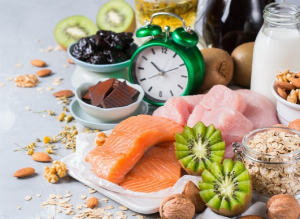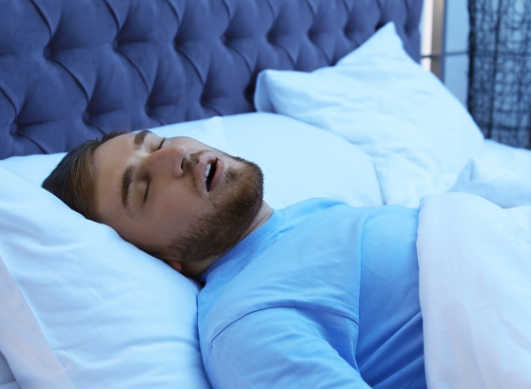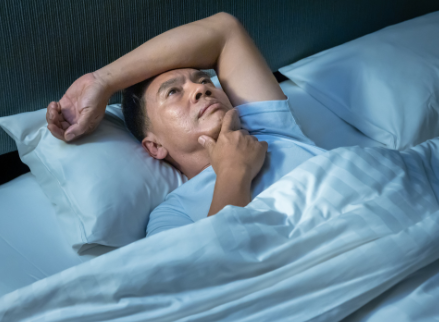Sleep apnea and diet - what is the link?
Published Jun 25, 2023 • Updated Jun 27, 2023 • By Claudia Lima
Sleep apnea is thought to affect between 3% and 8% of the world's population.
It is a complex disorder that can be influenced by various factors, including diet.
What is the link between sleep apnea and diet? What recommendations should you follow?
Read our article to find out all about it!

What are the causes and health consequences of sleep apnea?
People with sleep apnea experience recurrent, uncontrolled pauses in breathing during sleep, which can lead to poor sleep quality and a range of health problems.
This phenomenon is due to the relaxation of the muscles in the walls of the pharynx. Sleep apnea syndrome is the repeated closure of the airway in the pharynx, for 10 to 30 seconds or sometimes more, at a rate of at least five occurrences per hour of sleep.
The main risk factors for sleep apnea are age and excess weight.
As we age, our airways become less flexible. In case of excess weight or obesity, fatty deposits appear along the pharynx, neck, throat and tongue, leading to a narrowing of the airways and a reduction in the volume of the respiratory tract.
Sleep apnea is often associated with metabolic syndrome or type 2 diabetes, cardiovascular disorders (high blood pressure, atherosclerosis, etc.) and other complications.
Once sleep apnea has been diagnosed, and when it is linked to excess weight, the first therapeutic measures include change of diet and a healthy lifestyle. It is recommended that you sleep on your side, stop taking sedatives, practice good sleep hygiene, stop smoking and, among other things, lose weight.
Although obesity and other factors are associated with this condition, a growing body of research suggests that diet may also play an important role in the development and management of sleep apnea.
What is the link between diet and sleep apnea?
The link between diet and sleep is significant. As a result, the link between sleep apnea and diet is also very strong.
Diet influences the risk of developing sleep apnea
Diet is a risk factor, through weight gain of course, but also through the consumption of foods that should be avoided because they intervene with restful sleep.
Weight, or rather excess weight, influences the risk of developing sleep apnea. Several studies have shown that the higher the BMI (body mass index), the greater the risk of sleep apnea; other studies proved that over 58% of obese people suffer from sleep apnea and 81% of people with apnea are overweight.
What's more, if you lose weight, the AHI (Apnea-Hypopnea Index) falls. This index assesses the number and severity of apneas (interruptions in breathing) and hypopneas (reductions in breathing) per hour of sleep. If the index is between 5 and 15, sleep apnea is mild, between 16 and 30 - it is moderate, and if the index is above 30, sleep apnea is considered severe. If you lose more than 10% of your weight, there is a notable reduction in the severity of sleep apnea.
Certain foods can promote inflammation. Chronic inflammation can accentuate the narrowing of the airways and increase the risk of sleep apnea. This applies to fried foods, processed foods and foods rich in sugar.
Foods rich in saturated fatty acids and refined sugars, if eaten shortly before bedtime, can cause difficulty in falling asleep and micro-awakenings.
Sleep apnea influences our diet
Poor sleep quality has the following consequences for those affected:
- Significant fatigue,
- Disturbed emotional management: bad mood, hyper-emotionality, irritability,
- Reduced physical activity: less strength, weaker muscle tone and stamina.
All this leads to more frequent hunger pangs and the urge to nibble on high-calorie, fatty and sugary foods to stay awake.
On a hormonal level, sleep apnea causes an increase in ghrelin, a digestive hormone that stimulates appetite, and a drop in leptin, a digestive peptide hormone that regulates appetite by controlling the sensation of satiety.
In terms of behavior, people with apnea are awake for longer periods of time, so they have more time to eat and snack.
For some patients, this can be seen as a vicious circle. Sleep apnea has many causes, including diet and, sometimes, bad eating habits, as well as many consequences, including obesity.
Of course, each individual is unique. Weight gain or loss is not the same for everyone, and the effects of diet on sleep apnea can vary. In addition, other factors should also be taken into account to explain obesity and sleep apnea.
What diet rules should you follow in order to better manage your sleep apnea?
To sleep well, you need to eat well. And apart from respecting your sleep rhythm and needs, it's important to pay attention to what you eat, especially in the evening.
To put together a good evening meal, you need :
- ½ plate of raw or cooked vegetables, which are full of vitamins, minerals and, above all, fiber, which help to ease digestion, regulate blood sugar levels, enable you to fall asleep more quickly and get a deeper, more recuperative night's sleep.
- ¼ plate of proteins (meat, fish, eggs, etc.) which will feed the muscle. Muscles also work at night,
- ¼ plate of wholemeal starchy foods (rice, pasta, quinoa, bulgur, pulses) which will provide energy over a long period.
The combination of these three food groups will help you consume enough tryptophan. Tryptophan is an amino acid that promotes the synthesis of serotonin, a neuromediator which is a precursor to melatonin. Melatonin is essential for good quality sleep.
It is also advisable to add a source of unsaturated fat of plant origin (avocado, virgin olive oil, linseed, etc.) or animal origin (oily fish), which help combat systemic inflammation.
You should also remember to:
- Stay well hydrated throughout the day and after meals,
- Try herbal teas (vervain, lime blossom, chamomile) at the end of your meal, but not just before bedtime, to help you fall asleep,
- Take time to eat, eat calmly and while you are sitting down, chew well to ease digestion,
- Avoid stimulants and hot drinks just before bedtime,
- Limit or avoid alcohol consumption. Alcohol has a muscle-relaxing effect, causing muscles to slacken, encouraging snoring and accentuating sleep apnea. It also has a rebound effect, causing you to wake up earlier,
- Limit heavy meals because they make digestion more difficult,
- Engage in regular, appropriate physical activity, which is beneficial to both physical and mental health,
- Use medical devices designed to reduce sleep apnea: MAS (mandible advancement splint), CPAP (continuous positive airway pressure) to help you sleep better.
Diet plays a significant role in the development and management of sleep apnea. A balanced diet can help reduce systemic inflammation, maintain a healthy weight and promote better sleep quality. It is advisable to adopt a conscious approach to your diet and make choices that improve respiratory health and encourage restful sleep.
It is advisable to see a healthcare professional, such as a doctor, nutritionist or dietician, for personalized advice.
Was this article helpful to you?
Share your thoughts and questions with the community in the comments below!
Take care!
Sources :
Apnée du sommeil, inserm.fr
Vivre avec une apnée du sommeil, ameli.fr
Apnée du sommeil, de nouvelles recommandations..., has--sante.fr
Apnées du sommeil et alimentation, allianceapnees.org
Sommeil et alimentation, institut-sommeil-vigilance.org
Sommeil, apnée du sommeil et nutrition : quels liens, allianceapnees.org
2 comments
You will also like

Fighting Schizophrenia Symptoms: a Long Journey Against Paranoia after Denial and being Admitted
Dec 12, 2018 • 6 comments

 Facebook
Facebook Twitter
Twitter



